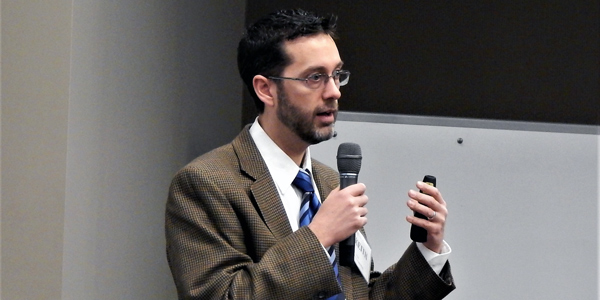SPP’s Market Monitoring Unit (MMU) last week conducted its first quarterly market report webinar, importing a practice MMU Executive Director Keith Collins used while at CAISO.

Collins | © RTO Insider
Collins called the Feb. 8 webinar a success, noting it attracted 40 participants. It followed the January release of its quarterly report. (See SPP Market Monitor: Negative Prices May Require Rule Changes.)
“It is not only a great forum for us to present on our quarterly report, but it also allows for great interactive discussion between market participants and market monitoring staff,” said Collins, who joined the MMU last year.
Staff reviewed the report’s highlights, focusing, as the report did, on the SPP market’s growing frequency of negative price intervals. The MMU said the market’s practice of self-committing resources in the day-ahead market may be exacerbating the situation.
“We’re not saying negative prices are bad, but they are an indication of what happens on the system as a consequence of thousands of megawatts not participating in the day-ahead market,” Collins told participants. “When they show up in the real-time market, it can create this disconnect.”

Negative Prices | SPP MMU Fall 2017 Quarterly Report
Collins said the MMU will repeat the practice following each quarterly and annual market report. The calls are open to members, market participants and regulatory staff, among other stakeholders.
“Our goal is to improve the markets through education and understanding of market outcomes,” he said.
December MISO-SPP M2M Results in $4.2M in Charges
SPP recorded its third consecutive month of multimillion-dollar market-to-market (M2M) payments from MISO in December, staff told the Seams Steering Committee on Feb. 7. The month’s $4.2 million in charges pushed the amount of M2M payments to SPP past $36.8 million.

M2M Update December 2017 | SPP
Permanent and temporary flowgates were binding for 531 hours in December. SPP’s Riverton-Neosho-Blackberry flowgate on the Kansas-Missouri border was once again responsible for the bulk of the charges.
The two RTOs began the process in March 2015. SPP last month said it has reimbursed MISO more than $2.25 million after resettlements of several M2M flowgates, and that it will continue to perform “limited” resettlements because of a memorandum of understanding between the two. (See “SPP Pays MISO $2.25M After M2M Resettlements,” SPP Markets and Operations Policy Committee Briefs: Jan. 16-17, 2018.)
Staff also briefed the committee on the Feb. 27 MISO-SPP Interregional Planning Stakeholder Advisory Committee meeting. The RTOs’ staff and stakeholders will discuss improvements to the Coordinated System Plan, which has identified four potential seams projects in two previous iterations. None of the four survived regional reviews.
SPP is also trying to meet with Associated Electric Cooperative Inc. before March 9. Staff have drafted a scope that identified needs from its 2018 Integrated Transmission Planning Near-term Assessment that are “electrically significant to the SPP-AECI seam.”
Board Approves Non-Jurisdictional Tariff Change
The Board of Directors approved a Tariff revision that incorporates a refund obligation for SPP’s nonpublic transmission-owning utility members during a special conference call Monday afternoon.
The measure addresses a FERC directive that SPP require non-jurisdictional transmission owners to refund revenues received associated with their service, and that it enforce the membership agreement in court (EL18-19). The RTO has a Feb. 28 filing deadline in the docket. (See FERC Backs off Nonpublic Utility Refunds in MISO, SPP.)
The 20-person Members Committee was divided on its advisory vote to the board, with five members — Empire District Electric, Oklahoma Gas & Electric, Public Service Company of Oklahoma, Southwestern Public Service and Westar Energy — casting opposing votes.
The proposal, which was recommended by the Corporate Governance Committee, includes a provision that should there be a conflict between a FERC refund order and state statute, the refund amount would be deemed uncollectable. Members questioned why non-jurisdictional members should be treated differently than investor-owned utilities and whether their customers might pick up the tab for those entities unable to provide refunds.
“If our customers are overpaid and there’s a refund order, our customers are left with a short amount,” said OG&E’s Greg McAuley.
Kansas City Power & Light’s Denise Buffington, who represents IOUs on the CGC, said she supported the measure because of her understanding that the Nebraska Constitution prevents its entities from delegating authority to someone else.
“I’m OK with this if SPP can show how everyone else will be kept harmless,” she said. “I will be closely scrutinizing the SPP filing. If it doesn’t show harm to other members, we will be filing comments in the docket.”
— Tom Kleckner




